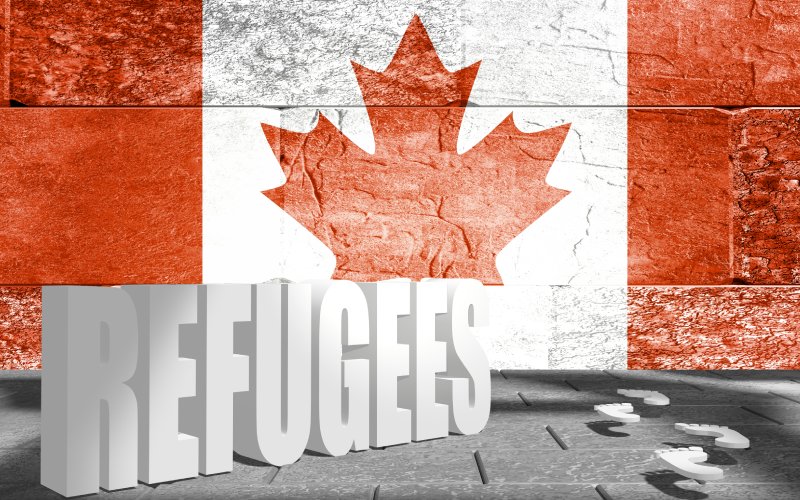If you are a prospective refugee seeking asylum in Canada, you will need to present your case in an honest and factual way to Canada’s Immigration and Refugee Board, and you need to follow the Government of Canada’s processes completely. However, you will also need to emphasize the impactful aspects of your personal story that vividly convey the genuine threats you face in your country of origin, so the dangers you personally face are clear.
Claiming From Inside Canada
This process is for individuals who are already in Canada and wish to make a refugee claim from within the country. You submit your claim while physically present in Canada and go through the refugee determination process, including a hearing before the Immigration and Refugee Board (IRB).
If you are already in Canada, with a well-founded fear of persecution, risks of torture, cruel and unusual treatment or punishment, or other risks to your personal safety in your home country, you can apply under this process.
Process
You will need to complete and submit a Refugee Protection Claim Form to the Immigration and Refugee Board of Canada (IRB). This includes details about your personal circumstances, the basis for your claim, and any supporting documentation. Completing this form and supporting statements factually, but with impact to clearly and powerfully support your claim is essential.
Your claim then undergoes a hearing. You present your case, providing evidence and testimony to support their claim for refugee protection. The RPD will assess the credibility of your claim and consider the legal requirements for refugee protection. Again, factual but compelling testimony is critical.
The RPD will make a decision; if your claim is accepted, you are granted refugee protection in Canada. If your claim is rejected, you may be able to appeal.
If you are in Canada, organizations like Oro Immigration can help with your application process.
Making Your Refugee Claim With Impact
To make a refugee claim that is compelling, clearly outline the reasons why you qualify under Canada’s Immigration and Refugee Protection Act. Provide specific, verifiable details that substantiate your claim, making your narrative compelling and unforgettable. Transparency is key; any inconsistencies may raise doubts about the credibility of your case.

Tips For Making Your Case
As you build your case, make sure to seek support as required, follow all requirements precisely, focus on evidence and fact, and fill in the facts with moving details that will resonate with the Refugee Board of Canada persons reviewing your case.
Canada Refugee Requirements
Start by familiarizing yourself with Canada’s refugee system, which is based on the Immigration and Refugee Protection Act (IRPA), and understand the criteria for refugee status.
Documentation and Evidence
Documentation and evidence is essential. In addition to any personal identification documents and other paperwork required for your application, having supporting evidence that proves the hardships you are facing lends credence to your statements. This helps prove the extreme hardships and dangers you are facing.
When you make a claim for refugee status, gather and submit comprehensive documentation supporting your claim. This includes personal statements, affidavits, country condition reports, and any other evidence demonstrating a well-founded fear of persecution or risk to your life, liberty, or security. If possible, obtain witness statements, as well, that confirm your risks.
Be truthful and transparent throughout the process. Any inconsistencies in your story can raise doubts about the validity of your claim.
Credible Fear
You have the opportunity to make personal written statements to support your claim. In your statements, clearly articulate the credible fear you have in returning to your home country. This may be difficult emotionally to do, but it is important to be thorough and expressive, so those reviewing your case can fully understand; demonstrating credible fear is essential.
Begin your personal statements with a detailed account of specific incidents or patterns of persecution you have experienced or fear in your home country. Explain the reasons behind the persecution, whether due to political beliefs, religious affiliation, ethnicity, or other recognized grounds in the Immigration and Refugee Protection Act. Use expressive language to convey the emotional and psychological toll, allowing decision-makers to connect with your experience.
Support your claims with relevant evidence and documentary proof. Address any potential gaps or inconsistencies in your narrative proactively, providing reasonable explanations. Emphasize the ongoing and immediate nature of the threats, illustrating that your fears are not theoretical but grounded in real and imminent danger.
Vulnerabilities
Highlight any specific vulnerabilities you may have, such as belonging to a persecuted group or having unique personal circumstances. Canada acknowledges gender-based persecution and other vulnerabilities in its refugee determination process. You need to be clear and specific about the nature of your vulnerability or persecution, and support with documentation and details.
The Government of Canada prioritizes certain refugee claimants, such as women, children, LGBTQ+ individuals or survivors of torture. If you belong to such a group, make sure to bring it to the attention of the immigration authorities.
Get Help: Psychological Support
Recognize the emotional toll that the refugee application process can take. Seek psychological support and counseling to help you cope with stress and uncertainty. This can help you present emotionally painful details of your history and the risks you would face if you returned to your country of origin; this is often difficult for prospective refugees, but is a necessary step in the process. This is especially helpful for preparing you for a refugee hearing, when you will need to speak about your experiences.

Get Help: Representation
Getting the help of a professional organization experienced in these types of situations is a significant benefit to you, as they are familiar with how to present your facts accurately, but compellingly, to ensure that the real risks and dangers you face are highlighted. They help you leave a strong impression on those assessing your claim.
The Oro Immigration team has experienced professionals with a wide range of backgrounds and qualifications. We have successfully helped many people gain refugee status, and can guide you through the process.
If you are currently in Canada, and wish to claim refugee status, we can help.
- Empowering Refugees: The Role of Specialized Immigration Consultants - April 12, 2024
- Step-by-Step Guide on Applying for an eTA - April 11, 2024
- NEW REQUIREMENTS FOR MEXICANS TRAVELING TO CANADA - March 3, 2024


